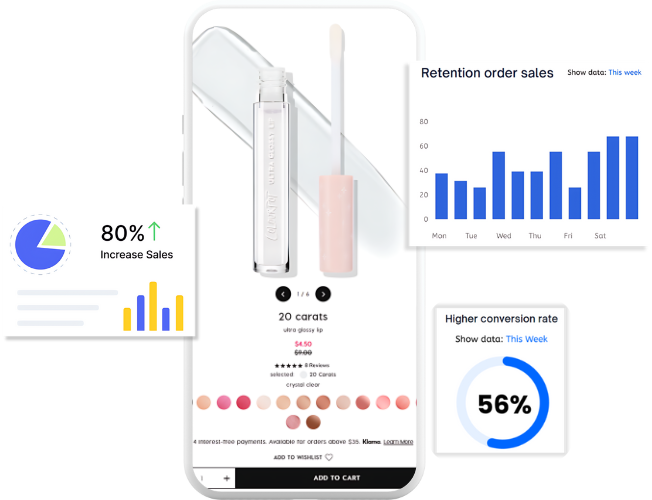Over the years, Shopify has become the most popular e-commerce platform in the world. As its popularity grew alongside the popularity of online shopping among the masses, many people looking to create an online store have asked, “Is Shopify worth it?”
The answer is among the four million online stores the platform hosts globally. Shopify provides scalable solutions for merchants worldwide, allowing them to create and run professional, highly competitive online shops.
In this article, we will take a deep dive into the benefits of Shopify and its drawbacks.
What is Shopify?
Shopify is an e-commerce store builder that offers a range of features and pricing plans designed to accommodate any merchant’s budget. A merchant can start selling on Shopify for as little as $1 while having access to the platform’s most advanced features. Their business model has helped 4.4 million online stores connect to consumers globally.
The platform’s commitment to helping merchants gain a foothold in e-commerce echoes Shopify’s humble roots as an online store selling snowboards in 2006. When people ask, “Is e-commerce worth it?” Shopify’s answer is a slew of affordable features, tools, and apps designed to help merchants make sales.
How Does Shopify Work?
Shopify allows millions of merchants to sell products by providing a convenient way to create an online store quickly. All merchants using Shopify, regardless of their package plan, get unlimited storage and bandwidth, which allows them to post unlimited products in their stores.
Additionally, Shopify enables businesses to grow sustainably by offering specially designed pricing plans. The platform’s plans work best with different-sized enterprises. One of the reasons why Shopify does this is to provide the best features and prices based on a store’s sales volume and number of shops.
Shopify Pros and Cons
Is Shopify good? Here are some of Shopify’s main advantages and disadvantages:
| Pros | Cons |
| User-friendly interface – Merchants can use a drag-and-drop editor to create their stores. | Costly advanced features and add-ons – some advanced features are only available in higher plans. |
| Multiple payment gateways – Shopify has over 300 payment providers and online payment gateways. | High transaction fees – merchants who don’t use Shopify Payments must contend with high transaction fees from other payment gateways. |
| Extensive library of apps and plugins – Merchants can leverage over 8,000 apps in Shopify’s app store. | A limited number of free themes – the platform encourages users to buy premium themes. |
| High shipping discounts of up to 88%. | Limited customization functions – hard to achieve a truly unique design without some coding knowledge. |
| Offline selling capabilities – Merchants can continue tracking inventory, accepting payments, and managing stock offline. | |
| Abandoned cart recovery – merchants can send up to three abandoned cart recovery emails. | |
| 24/7 reliable customer support | |
| In-person selling – merchants can sell in brick-and-mortar stores and pop-up shops using Shopify POS. |
Is Shopify Worth It?
Knowing the pros and cons of Shopify will help you get a general understanding of what the platform offers. However, to find out if Shopify is worth it, you’ll need to know the platform’s features and benefits deeper.
Here’s an in-depth look at the platform’s selling points.
User-friendly Interface
One of the best features of Shopify is its simple functionality, which allows merchants to get the ball rolling on their business. Merchants don’t need to enter their credit card details when signing up for Shopify; an email address is enough. After signing up, the platforms ask three simple general questions about the business and website you intend to start. Its simple setup process reduces the burden of starting an online store, especially for first-time merchants.
Done with the initial setup process, Shopify takes you to a dashboard to complete a 10-step checklist. Afterward, the platform encourages you to add several products. Shopify presents you with a checklist and encourages you to add products before even customizing your store because the platform is focused on helping you make your first Shopify sale successfully.
Once you’re ready to design your store, Shopify gives you an easy-to-use drag-and-drop store builder. There is no need for any technical knowledge, merchants can customize the store’s design and layout using the editor. Additionally, the platform gives you tons of built-in tools and features that make it easy to integrate third-party apps.
Shopify Pricing
Shopify offers three basic pricing plans, ranging from $29 to $299 per month. Although these costs might seem expensive to new merchants, the platform’s starting rate is incredibly competitive compared to other platforms. A three-day free trial period followed by a three-month offer at $1 per month. This amazing starting offer makes it easy for new merchants to answer the question, “Is Shopify worth it?” as the platform gives you enough time to launch your store and make sales at an affordable rate.
Let’s look at Shopify’s pricing plans.
- Basic Shopify: $25/month (billed annually); $33/month (billed monthly)
This is the best plan for merchants looking for an affordable way to start a small e-commerce business with unlimited products. You can expect basic reporting and up to 77% shipping discounts with Basic Shopify.
- Shopify: $69/month (billed annually); $92/month (billed monthly)
This plan is best for larger companies with several staff members. Merchants can enjoy lower credit card processing fees and a higher shipping discount of up to 88%.
- Shopify Advanced – $299/month (billed annually); $399/month (billed monthly)
Advanced Shopify is best suited for large businesses with an established customer base. The plan gives you up to 15 staff accounts and amazing e-commerce workflow automation.
In addition to the three pricing plans, Shopify also offers Shopify Plus for enterprises that need dedicated features and support.
Read More: Shopify Plans & Pricing
Shopify Themes
An online store’s theme goes beyond the general website appearance and layout. The theme you choose will impact the user experience (UX). Shopify understands the importance of themes that reflect brand identity through simple and subtle designs and layouts. For this reason, the platform gives you tons of themes and customization options, giving your customers the best shopping and browsing experience.
Shopify’s themes give you the ability to put yourself in your customers’ shoes and follow best practices in design principles. All themes are optimized for different screen sizes since most consumers shop on smartphones. The themes’ responsiveness to all devices, coupled with their great loading speed, really come in handy in making a good impression on customers. Remember, a professional website that is well designed will improve confidence in your brand, thus preventing customers from asking, “Is Shopify legit?” when in your store.
Read More: Shopify Themes
Payment Solution
When it comes to making payments through online payment gateways, Shopify excels at giving merchants and customers tons of reliable and secure payment options. There are two primary payment options: Shopify Payments and third-party payment gateways.
Shopify Payments is Shopify’s native payment processor, automatically installed in all Shopify accounts. The main selling point of Shopify Payments is that, unlike third-party payment options, there are no transaction fees. Merchants only have to pay standard credit card rates and fees when selling online and in person.
If merchants on the basic plan, for example, don’t use Shopify Payments, they would have to pay an online credit card rate of 3.3% + $0.30 per transaction and a 2% third-party transaction fee (It will vary depending on the plan and region selected by your store.) However, with Shopify Payments, they would only have to contend with the online credit card rate.
Third-party payment gateways, on the other hand, offer a greater degree of choice and flexibility when it comes to payment solutions. Shopify offers more than 100 online payment gateways and payment provider integrations like PayPal, Stripe, Airpay, and Amazon Pay.
Read More: Shopify Payments
SEO Capability
Most of the time, sites need an SEO specialist to perform on-site and off-site SEO to improve search engine rankings and online visibility. With Shopify, SEO is made so easy that merchants can take care of it themselves. Shopify has several SEO tools and features that let you optimize your site to boost the store’s online visibility and thus increase traffic.
You can easily customize the site’s meta tags, like titles, descriptions, canonical tags, and robot.txt files. These files make it easier for search engines to crawl and index your site. Furthermore, Shopify’s intuitive blogging platform allows you to create and publish quality content with keywords to target your audience. These on-site SEO practices are crucial for improving organic traffic sustainably.
Some off-site SEO tools and features that Shopify offers include email campaigns, retargeting ads, social media, and SEO app integrations. SEOAnt is one such app that can help you further boost your site’s SEO score.
Tools and Sale Features
When most people ask, “Is Shopify worth it?” they’re questioning its effectiveness and convenience in helping merchants make sales and grow their business. To answer this question, the platform has tons of dedicated features and tools designed to improve sales in e-commerce.
Shopify App Store
When it comes to the sheer number of apps, no other e-commerce platform can compare to Shopify. With over 9,000 apps, Shopify’s app store is extensive and diverse enough to have a solution for whichever issue a merchant might have, be it SEO, inventory management, customer support, product reviews, or marketing. All Shopify apps are tested and vetted to ensure they’re secure, effective, and authentic.
Make it easy to build and scale a reliable brand
Although Shopify apps are as helpful and convenient as possible, selecting and managing each app on your store can be tedious. You may need a Shopify expert to give you a post-purchase marketing solution with an integrated app stack.
Inventory Management and Shipping
Managing inventory and shipping with Shopify is highly convenient, thanks to the platform’s built-in inventory management features. Merchants can add products manually or use CSV files to import them in bulk. Data imports also make it easy to add other pieces of data, like customer and order information.
Additionally, you can add shipping apps like ParcelPanel to make order tracking or return management more convenient. Third-party shipping apps allow you to give your customers a better post-purchase experience.
#1 Shopify Tracking Solution for eCommerce
Shopify POS
Shopify Point of Sale (POS) allows merchants to sell products in person. This feature brings together your online and physical store in one place, so you can have a centralized system to manage all your business operations. With Shopify POS, you can process and manage orders, print receipts, and generate invoices using dedicated Shopify hardware and software.
Internationalization
Many Shopify success stories across borders show its impact on the lives of customers and merchants all around the world. Therefore, if you want to sell internationally, Shopify is your best bet. The platform has various sales channels, multi-language and multi-currency capabilities, numerous international payment gateways and partners, and location-based tax settings.

Easily translate store into multi-languages & multi-currency
Multi-Channel Selling
Shopify provides merchants with multi-channel and omni-channel selling capabilities so they can reach more customers. There are about eight sale channels in Shopify, including Facebook, Amazon, and Instagram, which allow you to supercharge your revenue.
DropShipping
Since Shopify is one of the best platforms to start dropshipping, many people ask, “Is Shopify worth it for dropshipping?” Yes. The platform makes it easy to sell products without holding inventory by offering guides on finding suppliers and order management systems.
Reporting and Analytics
All Shopify plans come with some reporting and analytics features and tools. You can leverage real-time store analysis on key performance indicators such as customer preferences and revenue growth to make data-driven decisions. Shopify also provides apps and integrations like Google Analytics, which enable you to get more detailed analytics and reports.
Hosting and Security
Shopify is a fully hosted e-commerce platform. Every online store or brand on the platform is hosted on Shopify servers. When getting started with Shopify hosting, merchants can either use a domain name they already own or buy a new one through Shopify.
Shopify hosting comes with no additional costs since the platform is fully hosted. In comparison, many other e-commerce platforms require merchants to pay separate ‘self-hosting’ server costs. So, although the initial hosting price might be low, these server costs may rack up over time and cost you a higher overall price.
“Is Shopify worth it when it comes to internet security?” Merchants can rest easy knowing they have Shopify PCI compliance in all six PCI standard categories right out of the box. These categories include:
- Maintain a secure network;
- Protect cardholder data;
- Maintain a vulnerability management program;
- Implement strong access control measures;
- Regularly monitor and test networks;
- Maintain an information security policy;
In addition to PCI compliance, Shopify stores also get free SSL certificates, payment data encryption, and TLS (Transport Layer Security.)
Support
The last point we’ll be looking at to answer the question of whether “Shopify is worth it” is the platform’s customer support.
While it is the norm for e-commerce platforms to have customer support, they can range in responsiveness and reliability. Shopify’s customer service is highly rated in numerous Shopify reviews. Customers can always rely on the platform’s customer support services, which are made up of a 24/7 support team available through email, phone, and live chat.
The dedicated support team is always ready to help customers with any technical issues. Additionally, people asking, “What does Shopify do?” can reach out to the team for more information about the platform or join Shopify community forums.
Shopify Reviews from Users
Finally, “Is Shopify worth it?” Here are some reviews from merchants who use the platform.
- All Shopify templates are optimized for selling, and I love how they automatically update to include new features or tools, no matter what Shopify plan you have.
- There’s less to worry about in terms of security when you choose a fully-hosted eCommerce platform instead of using open-source platforms to build an online store. I think it’s cool that you don’t even have to do anything, as Shopify takes care of all security issues in the background.
- I found Shopify’s abandoned cart recovery feature very useful. It’s integrated by default into all plans, which makes me feel like the company values all its customers. Also, it’s easy to manage abandoned carts from your Shopify admin dashboard.
- I’m glad I can start writing on the Shopify blog without having to install any apps. Adding tags and editing titles is so easy that it makes SEO less daunting of a task. My team found all the keywords we needed and customized all the necessary SEO parameters.
- With Shopify, selling on social media sites like Instagram and TikTok is easy. I just had to install the relevant apps in the Shopify marketplace and connect my profile. Once I downloaded the Marketplace Connect app, the support team helped me sync my product catalog to the Walmart and Amazon marketplaces.
In Conclusion
Shopify is a powerful e-commerce platform trusted by over four million merchants. However, deciding whether or not is Shopify worth it for you will depend on your business model, budget, and growth plan. Hopefully, this article has helped you get a well-rounded view of the platform. If you need more help getting started with Shopify, don’t hesitate to reach out to us.
FAQs
Note: This blog was originally written in English and translated using an automated tool to make the content accessible to a global audience. We believe in sharing valuable insights with everyone and apologize for any inaccuracies. If you spot any errors, please feel free to contact us for corrections. Your feedback helps us improve and ensures the content’s value is fully realized.






